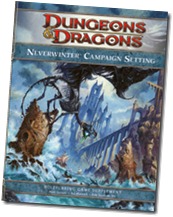 Not long ago, Wizards of the Coast released the Neverwinter Campaign Setting. It expands upon the information presented in the Forgotten Realms Campaign Guide, released in August 2008, while providing a standalone foundation for adventures set in the region surrounding the formerly great city of Neverwinter.
Not long ago, Wizards of the Coast released the Neverwinter Campaign Setting. It expands upon the information presented in the Forgotten Realms Campaign Guide, released in August 2008, while providing a standalone foundation for adventures set in the region surrounding the formerly great city of Neverwinter.
It’s good. You should get it.
Now, with my review out of the way, I would like to discuss the reason we are all here: Oghma’s Faithful.
Oghma’s Faithful is one of thirteen new themes presented in the book. Each theme ties into the setting in a far deeper way than its predecessors in the Dark Sun Campaign Setting. These are not simply occupations or random circumstances; they are reasons to be involved in the story at hand. In addition, each theme provides a power, item, or other benefit at 1st level, with a handful of other boons rolling in at 2nd, 6th, and 10th level.
At 1st level, Oghma’s Faithful gains the encounter power understand language.
Choose a language you have heard or seen within the past 24 hours. Until the end of the encounter, you can read and understand that language.
If you had chosen to make your character a Harper Agent, he would receive a magical pin with the blessing of one of three goddesses. An Iliyanbruen Guardian can drag a friend along when she uses fey step. The Pack Outcast can turn into a wolf.
The 1st-level feature of Oghma’s Faithful is not only substandard when compared to the other themes but also when taken on its own. As I have previously mentioned, language is a tricky business in RPGs. Any fantasy game worth its salt tries to have at least half a dozen, yet few if any provide a sensible, meaningful implementation of the difference between languages. Typically, languages in role-playing games offer an additional level of complication for a minimal return in entertainment.
Oghma’s Faithful manages to be useless on two levels. If the gaming group does not deal with the different languages in the game, then the theme’s ability is pointless. If the group does care about having Elven, Giant, and Supernal exist, then Oghma’s Faithful pulls a fast one and renders those differences null and void. Naturally, the DM can always construct a horribly contrived encounter where the character is faced with several languages at once, but it will quickly become old hat if repeated.
It breaks my heart to read the two-page spread of the theme. My dark secret is that I love Oghma’s Faithful. It is without a doubt the theme I find most appealing. I would like to think… no, I really do believe that whoever designed it put a lot of heart into it and shares my own love of learning and language. He wanted to say “See, here is a theme for those of you who want to play a badass scholar driven by divine visions.”
Unfortunately the horrible truth is that it just doesn’t work, because languages in RPGs don’t work. Oghma’s Faithful is just another heart-wrenching reminder.

As a GM, if a player chose Oghma’s Faithful, I’d do one of the following or both.
1) Include many old crypts and locations buried by volcano and other natural disasters. There would be old manuscrips in ancient languages or dialcts of the language and thus require the player to use his power to interpret them.
2) In a more political campaign, I’d let power to be used to decipher coded messages. Of course, those agencies would learn to write their messages so it reads normally once decoded but a member has to choose keywords out of the message.
I think there are a lot of things in RPGs that exist only because the Players have made choices for their characters that call for it. Things that exist as background elements until such time as a player puts something on their character sheet. A character can have a “Amazon girlfriend back home” and that means nothing until they take Leadership and suddenly that Amazon is helping the party kick butt.
Likewise the DM may just handwave languages and we can just assume that treasure troves have a bunch of scrolls in them that the PCs ignore because they can’t read them. Once someone takes Oghma’s Faithful or Focuses on adding languages to their character or whatever, they are telling the DM that these are the sorts of treasures they want their player to find. Is it really any different than how suddenly magic whips start showing up in treasure troves when the whip wielding master rogue goes out adventuring?
I believe it is different from the whip-master’s situation. As a weapon, a whip has its own set of benefits, and the rogue in question will likely have powers and/or feats making the use of the whip worthwhile within the mechanics of the game as well as flavor-wise.
Likewise, bringing the Amazon in confers whatever bonuses of its own, like an extra party member/bonuses to attack/however you wish to handle it.
There is no practical difference between an Oghma’s Faithful character finding a text in Abyssal vs. finding it in Common, aside from flavor, and the fact they had to pick an ability to do it.
It isn’t *pointless*, per se, but as I said the investment doesn’t provide a significant, entertaining return.